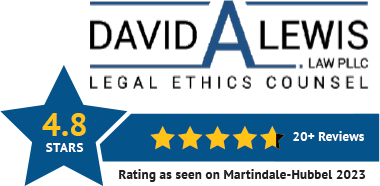
When Your Professional Reputation Is on the Line
There Is Value in Having an Ethics Violation Lawyer Advocate for You
Disclaimer: It is imperative to clarify that a New York Bar Association complaint is a common misnomer. Professional conduct complaints come through the NY Attorney Grievance Committee. Lawyers may encounter clients that are not familiar with the technical process of complaints, so we have included this disclaimer.
You’re practicing law and get a letter from The New York Attorney Grievance Committee. It’s a bad feeling to read the words, “…the attached complaint has been filed against you.” It’s intimidating to read further and learn that you have limited time to respond.
Clients have a lot of questions—first and foremost, “What is the worst case scenario?” You want to know what this complaint means and how it can affect your career and your practice. You need to understand the range of consequences and how each could impact you. Fear is going to have you wondering if this problem will interrupt your ability to make a living. These are all typical feelings and questions.
You take your reputation very seriously, so a complaint is a real threat. Maybe you’ve been practicing law for decades without a complaint. You might have personal feelings and strong emotions about the complaint (frivolous complaint, bitter client that does not want to pay, fee dispute). What’s important though is moving beyond those frustrations and seeking help from a New York ethics attorney as swiftly as possible.
Why David A. Lewis Law?

Minimized Damage
David values and encourages honesty, cooperation, mitigation, de-escalation, and preventative measures to work to ensure the best outcome of your case and chance for dismissal of the complaint.

Exceptional Judgment
Ethics is David’s sole area of practice, so you can be sure he’s knowledgeable and can advise you in the most logical but creative and compassionate way to resolve your case.

Extensive Experience
As the former Chair of the NYC Bar Association’s Professional Responsibility Committee and a member of many others, David has an outstanding reputation in the New York legal community.

It’s Time to Defend Against the New York Attorney Grievance Committee Complaint
You May Be Wondering, “What Is My Plan and What Should I Do?”
Being busy is the norm for attorneys, and at a minimum, it’s a bad use of your time to try to defend yourself. You need an ethics violation lawyer and you need guidance through the process. Maybe you’ve tried to respond already or you’re tempted to do so. When you think about the lost billable hours, you remember Abraham Lincoln famously said: “He who represents himself has a fool for a client.”
My Working Philosophy as a New York Ethics Attorney…
Shapes the Way We Work Together on Your Case
When I advocate for New York attorneys on professional conduct matters, my working philosophy is important. You can expect me to take the following approach with your case as we determine how to respond to a New York Attorney Grievance Committee Complaint.
- Whenever possible, responding quickly and honestly has the best chance of getting the complaint dismissed. Let’s identify all concerns and take sincere proactive steps to address them. As an ethics violation lawyer, I recommend responding with candor and full cooperation—taking responsibility for your part. There is rarely a time when it is too late to take some remedial measures to defend against NY Attorney Grievance Committee complaints or mitigate your mistakes.
- My approach as a New York ethics attorney is always about prevention, mitigation, de-escalation, and minimizing damage. Where appropriate, my preferred working method is to guide clients away from conflict and hostility. Our aim is usually to have the least interference with your professional life. If the complaint should end in consequences, we want them to be in the lower range of possibilities.
- In New York Attorney Grievance Committee complaints where someone has made a regrettable mistake, the right advocacy can help state your case in the most credible fashion. Just explaining how you are a really honest person is unlikely to suffice in a defense against NY Attorney Grievance Committee complaints. How do you demonstrate that a mistake was in fact a mistake and that it won’t happen again? I thrive on defending initial complaints as an ethics violation lawyer on behalf of my clients. My aim is to provide a sincere, impassioned defense that helps you truthfully and thoughtfully share your account.
- There is great value in understanding what the red flags are and how to address them. Knowing the important factors that go into any professional conduct analysis can be strategically critical. As an experienced New York ethics attorney, I can help guide the strategic approach with respect to the presentation of truthful information provided in response to NY Bar Association complaints.
Let’s Understand the Context for New York Attorney Grievance Committee Complaints
It Will Give You a Feel for How This Works

A General Outline of Process And Potential Consequences
Here’s A Bit Of Background on Attorney Disciplinary Matters
The process generally starts with a complaint requiring you to submit a written answer. As the Respondent, you will need to address all of the allegations in the Complaint.
1 Submit A Written Answer to Complaint— All complaints should be met with a written response. This is an important opportunity to provide relevant factual and legal background information to put everything into the proper context and perspective.
2 Follow-up Questions And/Or Requests— There may be additional follow-up questions from the New York Attorney Grievance Committee Staff Counsel conducting the investigation. It could also involve a request for documents, or a request for an Examination Under Oath. All of these should be navigated with extreme caution and with the benefit of the advice of a New York ethics attorney.
3 Complaint Is Either Dismissed or Additional Action Taken— This investigation may end in one of two ways: The complaint will either be dismissed and the Attorney Grievance Committee’s file can be closed, or some other action will be taken.
If The Complaint Is Not Dismissed
When a complaint is not dismissed, there are a range of potential consequences. It is best to seek counsel with a New York ethics attorney in any case.
- Letter of Advisement— If the Complaint is not dismissed, the Respondent could receive a Letter Of Advisement. This is basically a confidential “warning” letter and does not constitute professional discipline. While it is not public, a New York Attorney Grievance Committee or Court may consider it in the future in determining the action to be taken or the discipline to be imposed upon any subsequent complaints.
- Admonition— If professional misconduct is found, it may not warrant public discipline. A potential result is a private admonition. This is a private form of discipline. Again, it is not public, but an Attorney Grievance Committee or Court may consider it in the future in determining the action to be taken or the discipline to be imposed upon a subsequent finding of misconduct.
- Formal Charges— For serious misconduct, formal public charges may be brought by the New York Attorney Grievance Committee. In this case, a hearing will likely be involved, and things get much more difficult, complex and expensive to defend against complaints. Potential outcomes can include:
- A public censure
- Suspension
- Disbarment
Schedule a Conversation With a New York Ethics Attorney Before Responding to an Attorney Grievance Committee Letter
To Determine if You Wish to Engage David A. Lewis to Defend You as Your Ethics Violation Lawyer
It is important to remember that a significant number of initial Attorney Grievance Complaints ultimately get dismissed. However, there are two questions about risks that I like my clients to consider:
- Do you want to risk the consequences of potentially mishandling a defense against an unwarranted Attorney Grievance Complaint?
- Do you want to risk potentially raising other unexpected red flags that could trigger further investigation even when you have nothing to hide?
Most lawyers appreciate the importance of getting these matters right the first time. Invest in the peace of mind that comes with knowing you are taking control of protecting your reputation and your livelihood by hiring an experienced New York ethics attorney.
If You Have Just Learned a Complaint Has Been Filed Against You
Call a New York Ethics Attorney to Find Out How You Might Benefit From Representation
It is almost always wise to be represented by experienced counsel to defend against NY Attorney Grievance complaints. It is certainly always wise to at a minimum have a conversation to determine if you need representation in front of the New York Attorney Grievance Committee. Let’s discuss whether or not your situation requires representation from an ethics violation lawyer.
